NBA 2K25 Point Guards: How much does the perfect build cost?

NBA 2K25 launched Sept. 6, starting players of its enormously popular MyCareer suite all over again in search of building a player matched perfectly to a position and the user’s play style. Alone among sports games with a single-player career and heck, even the larger role-playing genre from which they draw, NBA 2K faces players with an uncomfortable question.
How much does my NBA 2K build cost?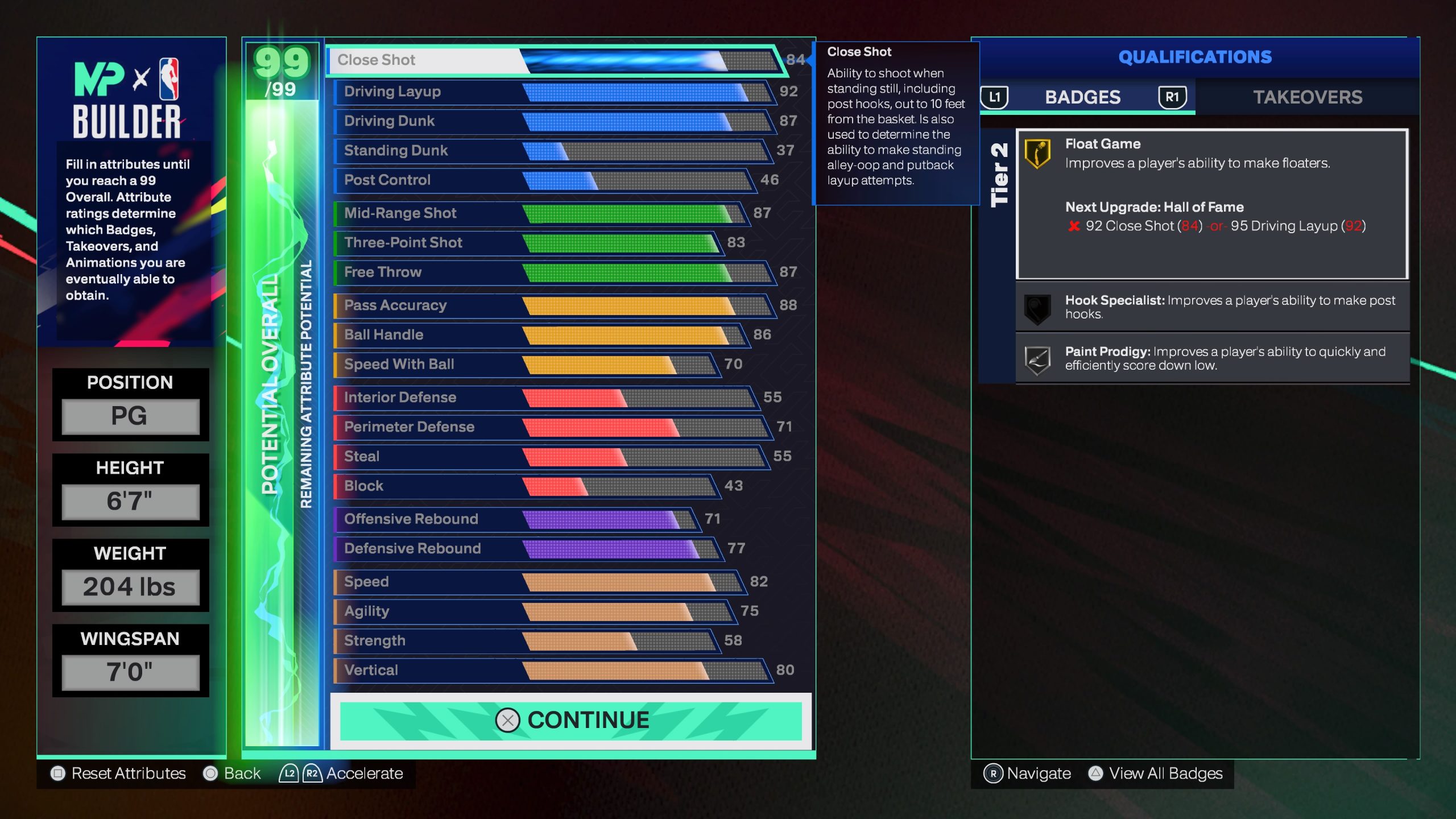 The recommended build for an NBA 2K25 point guard is a 3-Level Scoring Playmaker
The recommended build for an NBA 2K25 point guard is a 3-Level Scoring Playmaker
This is because player progression in NBA 2K’s career mode is advanced by spending Virtual Currency, and Virtual Currency can be bought up for real money. It’s literally a pay-to-win scenario, albeit with a few gates and brakes keeping players from buying everything they want immediately.
It’s tolerated probably because 2K Sports introduced the system more than a decade ago, long before such a scheme would draw an outcry in present day. Well that, and the fact MyCareer is probably the most popular mode in a very well done series that is a global best-seller.
Still, it introduces another consideration when players are scheming up their virtual hooper’s designs: Is there a way to more efficiently level up a created superstar, or optimize undervalued traits that return more steak than sizzle?
Let’s go ahead and answer that question, both for this guide to building the best point guard in NBA 2K25, and the other four positions coming soon: No.
NBA 2K’s progression-and-currency system is non-linear, and continually refined year-to-year, and even altered by things such as the player’s height depending on the attribute improved. The result is that spending 100,000 Virtual Currency (the amount included with this year’s $99.99 All-Star Edition) on an out-of-the-box, 60-rated player is likely to give you a 75-rated overall baller, almost regardless of build.
Further, to immediately rank a player up to MyCareer’s starting Overall cap of 85 will cost about 190,000 VC, almost regardless of the order in which the skills are upgraded.
So while I’ll be listing costs and ratings for these builds, bear in mind they all follow the same trajectory in terms of cost. The price tags presented are just to give you an idea of what you’re getting yourself into.
Explaining some build terms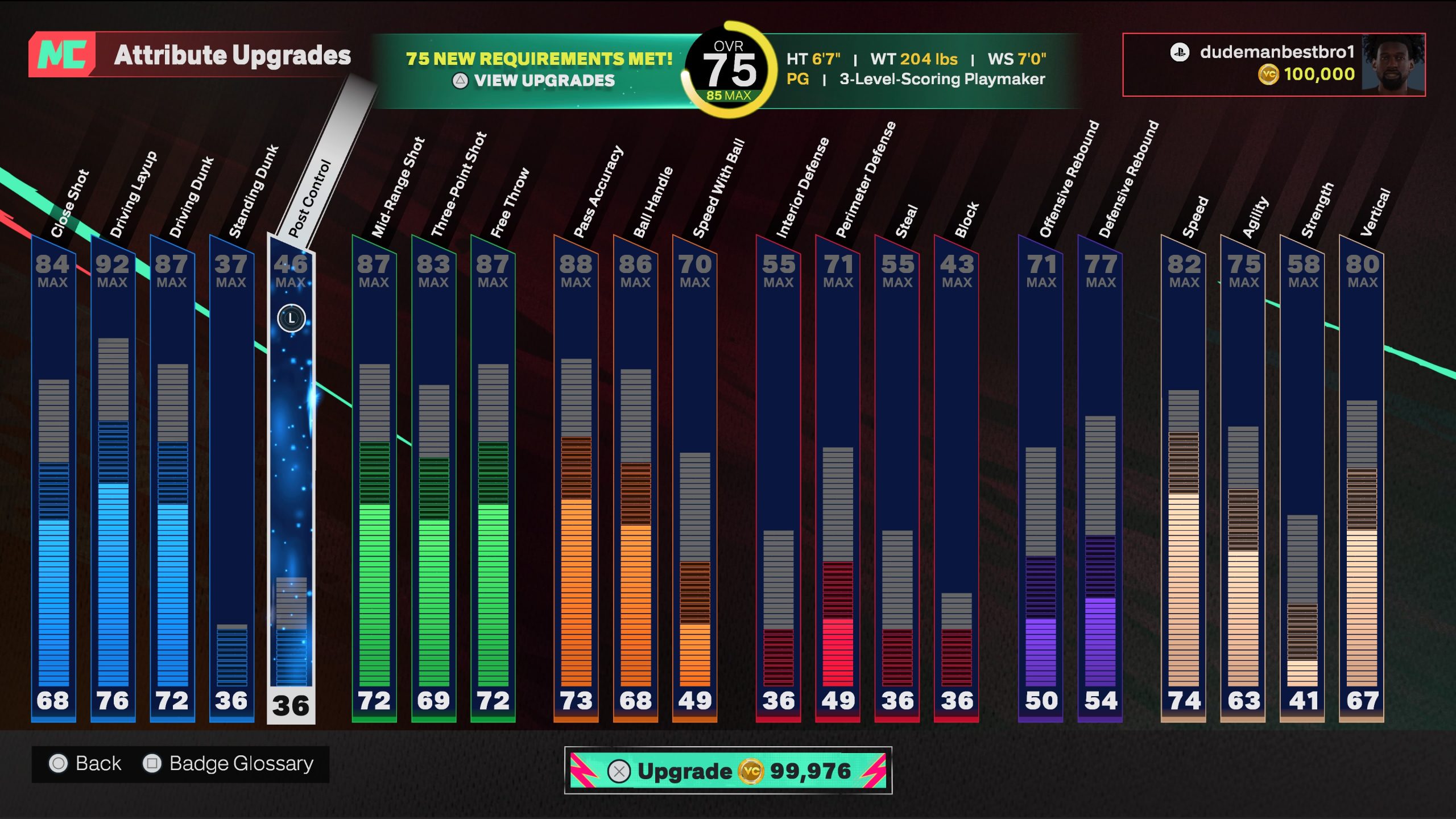 The 3-level scoring playmaker’s rating and attribute scores after spending 100,000 VC.
The 3-level scoring playmaker’s rating and attribute scores after spending 100,000 VC.
Build order is the rank, in order, of each attribute’s importance to creating this player, figuring in its cost for a player of this physical makeup. Attributes with a lower return to the OVR may appear higher in the build because they’re so cheap; attributes critical to the build may appear lower because they are so expensive.
Rating at 100,000 VC means the player’s Overall rating when the Build Order is applied evenly until 100,000 is spent. Similarly, Cost at 85 rating is how much VC is spent when the Build Order is evenly applied until the 85 level cap is reached.
Some players like to max out their Physical attributes (Speed, Strength, Vertical, and Agility) as well as Free Throw at the beginning of the career, either because they return little to the Overall Rating or because they’re gate points for certain animations. If this is a method of role-playing or development you take, we’ve tallied the cost of this improvement separately so you know what you’re in for.
An “out of position attribute” is one that, when fully maximized under this build, does not by itself return one point to the Overall score. This is basically the dead weight in your build. We’ve broken out their cost in case players prefer to max them out early in order to focus on more important qualities later, when they are earning more VC for stronger play in their Career.
NBA 2K25’s best point guard build: 3-Level Scoring Playmaker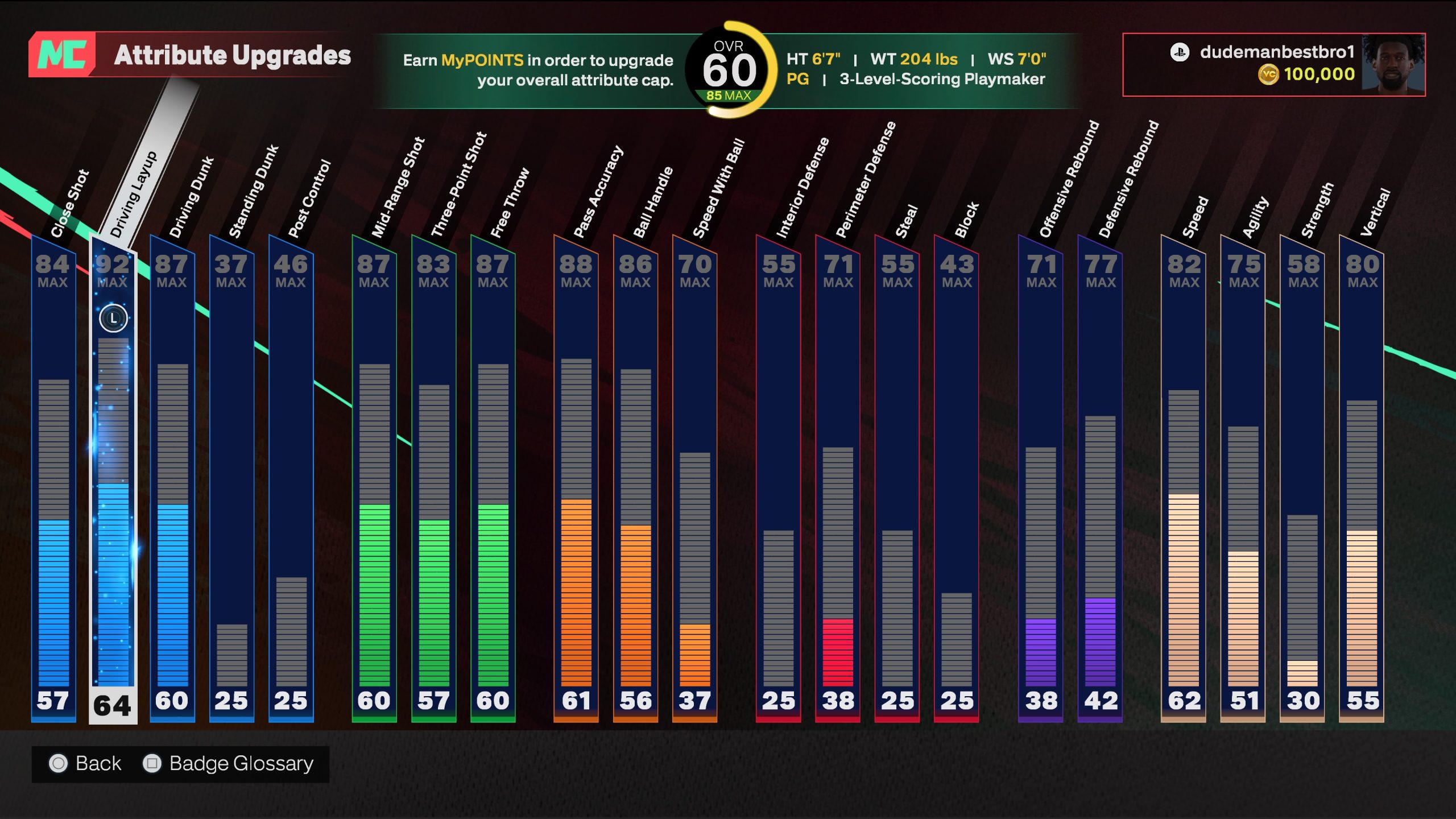 The starting attribute scores for a 60-rated 3-way Scoring Playmaker at Point Guard.
The starting attribute scores for a 60-rated 3-way Scoring Playmaker at Point Guard.
- Height: 6-foot-7
- Weight: 204 lbs.
- Wingspan: 7-foot-0
- Rating at 100,000 VC: 75 (11, then build)
- Cost at 85 rating: 189,991 VC (18, then build)
- Cost to max Physical attributes and Free Throw: 34,153 VC
- Cost to max out-of-position attributes: 8,016 VC
- Rating with Physicals and out-of-position attributes maxed: 70 (cost 48,482 VC)
Best value: Defensive Rebound. At a max of 77, it actually does contribute to your Overall rating (a single point) and has the cheapest max cost (4,566 VC) of any attribute that can affect the bottom line by itself.
Least value: Perimeter Defense. Although a maxed attribute here would add 2 points to your Overall’s bottom line, that also costs almost 12,000 VC. While it’s good to have some defensive ability, and 77 at least qualifies there, it’s also not at all a defining feature of this build the way Speed or Agility are, nor is it a secondary support trait like Close Shot.
Build order for a 3-Way Scoring Playmaker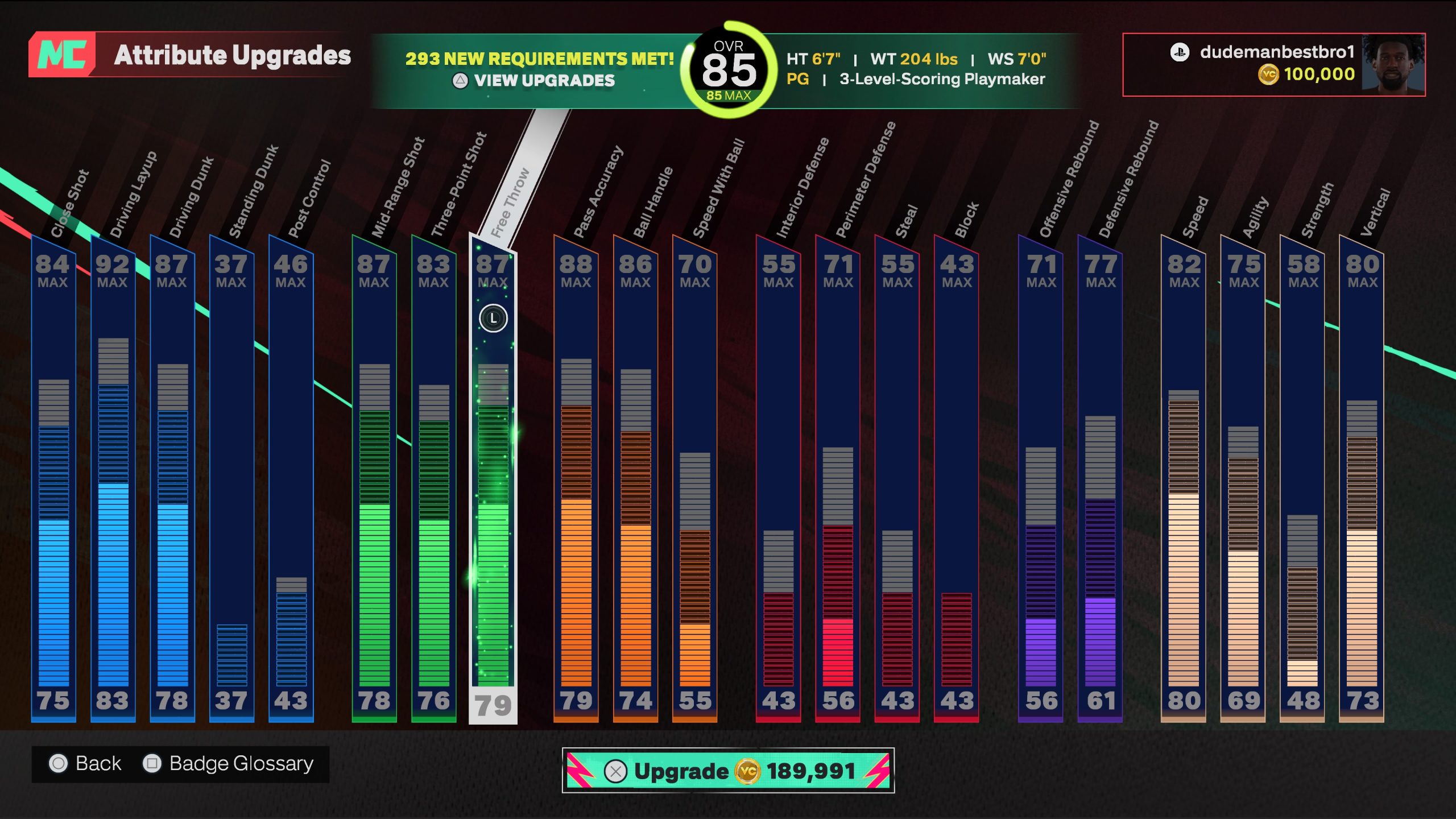 The attribute scores and VC cost to take a 3-Way Scoring Playmaker point guard to an 85 rating following the Build Order.
The attribute scores and VC cost to take a 3-Way Scoring Playmaker point guard to an 85 rating following the Build Order.
- Driving Layup
- Three-Point Shot
- Ball Handle
- Pass Accuracy
- Mid-Range Shot
- Speed With Ball
- Speed
- Driving Dunk
- Agility
- Vertical
- Defensive Rebound
- Close Shot
- Strength
- Free Throw
- Perimeter Defense
- Offensive Rebound
- Steal
- Block
- Standing Dunk
- Interior Defense
- Post Control
- Tier 1 Badges Bronze: Bail Out, Challenger, Lightning Launch,Limitless Range, Rebound Chaser, Versatile Visionary
- Tier 1 Badges Silver: Ankle Assassin, Deadeye, Handles for Days, Posterizer, Set Shot Specialist, Shifty Shooter, Unpluckable
- Tier 2 Badges Silver: Layup Mixmaster, Off-Ball Pest, Paint Prodigy, Slippery Off-Ball
- Tier 2 Badges Gold: Break Starter, Dimer, Float Game
- Tier 2 Badges Hall of Fame: Aerial Wizard
My experience with point guards in the NBA 2K series finds that their passing and ballhandling moves are more effective, and frankly more fun, with and against human competition online than in Career, where it’s more dependent on AI opponents getting themselves open or the user themselves calling a set play. That’s why this build opts for a point with scoring capabilities, mainly so the user can take over a Career game and do it all if they must.
From there, I’m always a sucker for size, in the mold of Magic Johnson (whose 6-foot-9 height is not available at this position in NBA 2K25; it tops out at 6-foot-7). First, you don’t have to teach or develop height. Next, a point guard who can rebound is an infuriating and demoralizing opponent in multiplayer.
Rebounding, especially in NBA 2K, depends a lot on position (and therefore Post Control) but in wider-spaced 2-on-2 and 3-on-3 games out in the City, this is a point guard who can get to the rim either to finish or to clean the glass. But generally speaking, the best builds are ones that leave at least one area outside of the position’s core game where the user can be effective, even if that adds nothing to their overall rating.
The price paid is the relative lack of emphasis on Perimeter Defense (71 max) and Steal (55). Your defense will be mainly keeping the ball out of the other team’s hands and running a very efficient offense. Though Steal accounts for a player contextually stepping into a passing lane to swat or intercept a bad pass, I’ve always found its more active role — forcing a ball pickup or turnover — to be an input intensive timing exercise that has as much to do with matching the ballhandler’s movements as it does whacking X or Square at the right time.
Best teams for this point guard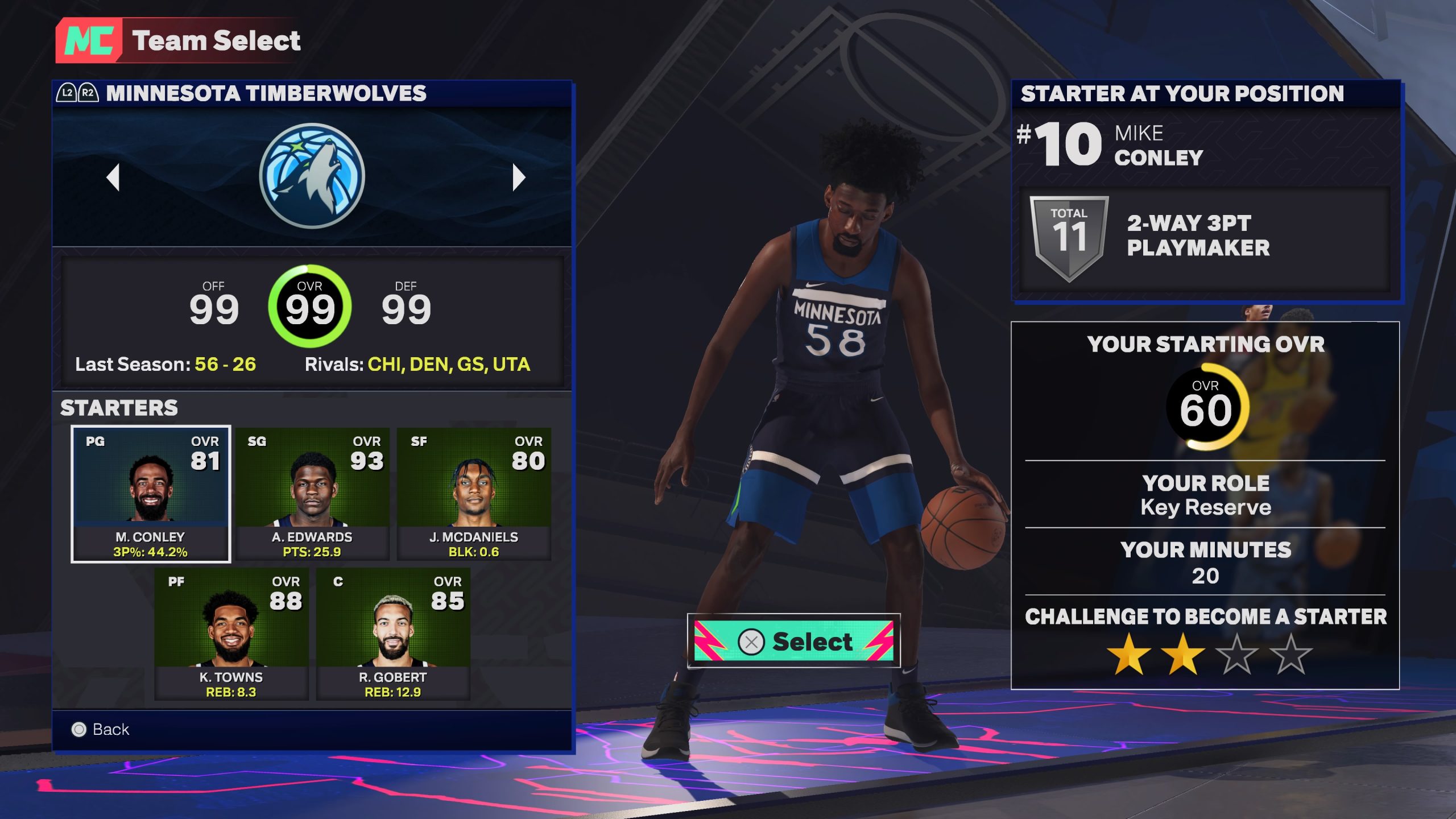 The Timberwolves are a super-team in waiting for this kind of a point guard, and the starter’s 81 rating is easily overcome in the first season.
The Timberwolves are a super-team in waiting for this kind of a point guard, and the starter’s 81 rating is easily overcome in the first season.
The easiest teams to make starter are weak with one exception: Miami, who has a 75-rated incumbent in Josh Richardson, with a 99-rated team offense and 96 overall rating.
That said, give Minnesota serious consideration. Mike Conley is the 81-rated incumbent, and you can buy your way past him in OVR rating at the outset if you wish. The rest of the team is 99 in every department and you get to lob it to Rudy Gobert, Karl-Anthony Towns, or dish to scoring machine Anthony Edwards all game long.
Other opportunities to start quickly with a team in need of a point guard solution are Washington and Brooklyn, both of whom are in big-time rebuilds. Portland and Utah already drafted point guards for theirs. Chicago and the Lakers are worth considering for their relatively low incumbent ratings (81 each).
What about other positions?- Here’s the recommended Shooting Guard build, a 3-Way Scoring Threat.
- Here’s the recommended Center build, a 2-Way Inside-the-Arc Maestro.
Other positions will follow.
Virtual Currency prices in NBA 2K25These prices are the same regardless of platform (Nintendo Switch, PlayStation 4, PlayStation 5, Windows PC, Xbox One, and Xbox Series X)
- 5,000 VC: $1.99
- 15,000 VC: $4.99
- 35,000 VC: $9.99
- 75,000 VC: $19.99
- 200,000 VC: $49.99
- 450,000 VC: $99.99
- 700,000 VC: $149.99
Featured image via 2K Sports (screen capture)
The post NBA 2K25 Point Guards: How much does the perfect build cost? appeared first on ReadWrite.
